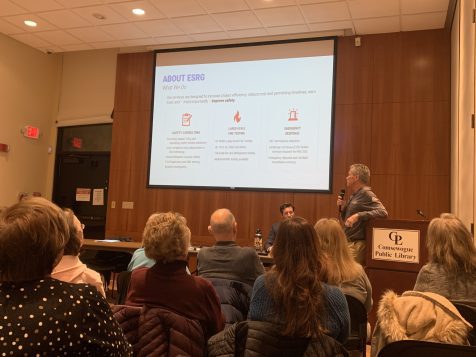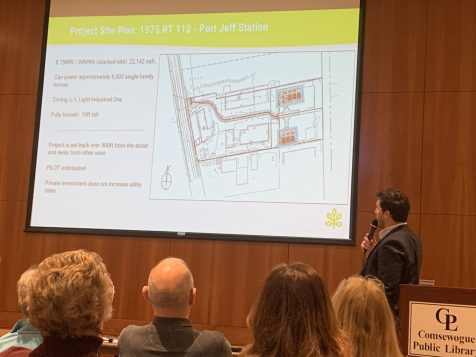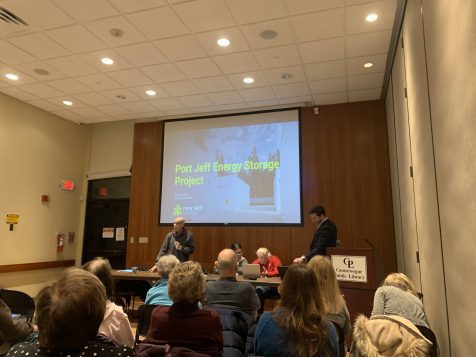By Sabrina Artusa
At the Sterling Woods Condominium annual meeting on Feb. 20, New Leaf Energy Senior Director of Business Development Michael Conway spoke to the residents, whose condominiums neighbor the proposed site at 1575 Route 25A in Port Jefferson Station.
This proposal comes after the Town of Brookhaven rejected a rezoning application by New Leaf Energy in June 2024.
Now, New Leaf Energy, a renewable energy developer, is planning an 8.75-megawatt battery energy storage system in an area with the appropriate light industrial zoning. The system would occupy 22,142 square feet and can power 8,500 single-family homes for 4 hours.
Conway, joined by Energy Safety Response Group co-founder Paul Rogers, reviewed the site plan, which neighbors a gas station. The property will be encompassed by a 10-foot-tall fence and vegetative screening and will include a 50-ft setback.
“Dense places are the most difficult places to get electricity to,” Conway said, addressing the location. “We need to have electricity whether it comes through a fossil plant, or it comes in through a solar plant, or it comes in through transmission lines. Energy storage systems are an efficient way to deliver more electricity to an area without building more poles and wires all over the place and more power plants.”
One resident said, “I don’t think we disagree with technology. I don’t think anyone does. We have to look forward. But where are you putting it? There is no benefit to be putting this here, absolutely none. Basically, you want us to be a test case for your business.”
New Leaf Energy will be working with manufacturers to develop the system and will then sell the BESS. Defined as a business that “establishes important partnerships with landowners, utilities and local communities to brainstorm, secure, design and permit community and utility-scale renewable energy,” New Leaf Energy essentially works to give the project momentum and get it approved before then selling to another company for around $3 million to $4 million.
“Our business model is to transfer ownership to a long-term asset owner just prior to construction,” Conway said. It usually takes 6-8 months to find a buyer. The buyer will then be responsible for the safety and operation of the system, including the battery monitoring system.
The oldest BESS New Leaf Energy has created was built in 2018. The largest is 200 megawatts.
This system will help manage the grid during peak hours and potentially save PSEG from having to purchase additional equipment. The BESS will be privately owned so will not, in theory, be the direct cause of rate increases from PSEG. Instead, the system will store energy in times of low demand and sell it back during high-demand times.
Rogers, who has been a prominent figure in the battery energy storage conversation throughout Brookhaven, says that manufacturers are required to permit large-scale controlled failures on their equipment. This could mean burning cells or, in some cases, modules.
Rogers said that thermal runaway is caused when the cells are interfered with or abused and are unable to regulate normally, thus causing the liquid within the cells to turn to gas. For instance, if a container is not sealed properly when it is raining, the water could cause electrical problems.
Rogers, who has helped implement and navigate the various safety codes, said that the BESS has to be listed under Underwriters Laboratories UL9540, which authorizes that the equipment is up to standard, and must adhere to precautions listed in the National Fire Protection Association codebook as well as New York State codes.
The Moss Landing fire, which burned for days and led to the evacuation of residents, was described by Brookhaven Councilman Jonathan Kornreich (D, Stony Brook) as “sobering.” The old and outdated system consisted of nickel manganese cobalt batteries as opposed to lithium iron phosphate, which is less energy dense, and was situated in a designated-use building.
Rogers said of the 750-megawatt system, “we would never use that technology today.”
“This is fairly new technology,” said Kornreich. “It is almost as if the car had been invented and they said oh this is a great way to make deliveries and drive around town but they haven’t invented the brake pedal yet…we don’t know yet and that is why we have to go slow with these things.”







